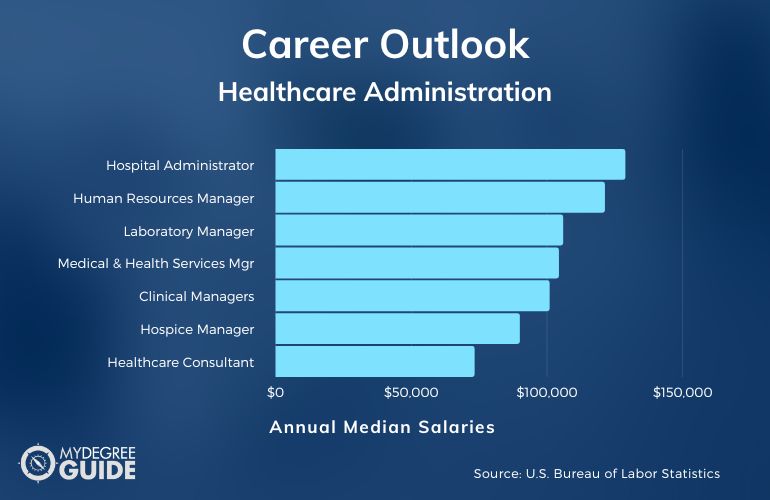Looking for Healthcare Administration degree online programs? Compare schools and see what you could be doing after graduation.

If you’re interested in the behind-the-scenes work of running a hospital or medical office, consider getting a healthcare administration degree online.
Editorial Listing ShortCode:
It can teach you the same things as a campus-based degree, but you can learn from the comfort of your own home, and you can become qualified to enter many different healthcare-related fields in which you could potentially build your career to make more than $100,000 per year (Bureau of Labor Statistics).
Universities Offering Healthcare Administration Degree Degrees Online
Methodology: The following school list is in alphabetical order. To be included, a college or university must be regionally accredited and offer degree programs online or in a hybrid format.
1. Champlain College
Champlain College is a private college located in Burlington, Vermont, that was founded in 1878. The college offers bachelor’s and master’s degree programs in more than 80 areas of study. More than 15 associate’s and bachelor’s degrees offered by Champlain can be completed fully online.
In addition, 24 graduate degrees offered by the school can be completed online. In addition to its Burlington campus, Champlain has a number of international campuses.
- BS in Healthcare Administration
Champlain College is accredited by the New England Association of Schools and Colleges.
2. City University of Seattle
City University of Seattle in Washington was established in 1973. Enrollment is over 6,000 with around 500 international students every year. Undergraduate, graduate, and doctoral studies are available. U.S. News & World Report has ranked City University of Seattle’s bachelor’s degree programs among the best online programs in the country.
CityU has educational partnerships with dozens of state and international universities.
- BS in Healthcare Administration
City University of Seattle is accredited by the Northwest Commission on Colleges and Universities.
3. Colorado State University
Colorado State University is a public research university located in Fort Collins, Colorado. Established in 1870, Colorado State currently enrolls roughly 33,877 students. Students can pursue studies in 55 academic departments spread across eight colleges. Bachelor’s, master’s, and doctorate degrees can be pursued.
- BS in Healthcare Administration and Management
Colorado State is accredited by The Higher Learning Commission.
4. Concordia University – Saint Paul
Concordia University St. Paul is a liberal arts university located in Saint Paul, Minnesota, with a student enrollment of approximately 5,000 students. It is one of the nine members of the Concordia University System.
This Lutheran-affiliated school was founded in 1893. Bachelor’s, master’s, and doctorate programs are available through on-campus and online studies.
- BA in Health Care Administration
Concordia University – Saint Paul is accredited by The Higher Learning Commission.
5. Davenport University
Established in 1866, Davenport University is a private university with campuses spread throughout Michigan. Online degree paths are available to Davenport’s more than 7,232 enrolled students. More than 50 areas of study for associate’s degrees, bachelor’s degrees, and master’s degrees can be pursued through Davenport’s five colleges.
- BS in Health Services Administration
Davenport University is accredited by the Higher Learning Commission.
6. DeVry University
DeVry University offers on-campus and online learning options for its more than 17,300 enrolled students. DeVry offers dozens of campuses spread across 18 states. The school was founded in 1931. DeVry University’s academic offerings are spread across five colleges offering associate’s, bachelor’s, and master’s degrees.
- Bachelor’s degree in Healthcare Administration
DeVry University is accredited by The Higher Learning Commission.
7. Drexel University
Drexel University is a private research university based in Philadelphia, Pennsylvania. Founded in 1891, the school boasts an enrollment of 24,190 today. Students can pursue more than 70 undergraduate programs. In addition, more than 100 options for master’s and doctoral programs are available.
Drexel is considered a pioneer in online learning due to the fact that it introduced its first online master’s program in 1996.
- BS in Health Services Administration
Drexel University is accredited by the Middle States Commission on Higher Education.
8. Florida International University
Florida International University is a public research university in Greater Miami, Florida. It is classified among the “R1: Doctoral Universities – Very High Research Activity” and considered a “research university” by the Florida State University.
- Bachelor of Health Services Administration
Florida International University is accredited by the Southern Association of Colleges and Schools Commission on Colleges.
9. Fresno Pacific University
Established in 1944, Fresno Pacific University is a Christian university located in Fresno, California. It offers bachelor’s, master’s, and doctorate programs across five schools. More than 40 fields covering more than 100 areas of study are available for bachelor’s students alone. Student enrollment is nearly 4,000.
- BA in Health Care Administration
Fresno Pacific University is accredited by the WASC Senior College and University Commission.
10. Grand Canyon University
Grand Canyon University is a Christian university in Phoenix, Arizona, offering bachelor’s, master’s, and doctorate degrees. It was established in 1949. GCU students can earn degrees by studying through the institution’s nine colleges. More than 100,000 students are currently enrolled in on-campus and online classes offered by GSU.
- BS in Healthcare Administration
Grand Canyon University is regionally accredited by the Higher Learning Commission.
11. Indiana Wesleyan University
Indiana Wesleyan University is a private school headquartered in Marion, Indiana. Founded in 1920, IWU is considered the largest private university in all of Indiana today with help from an enrollment number topping around 13,000. Students can choose to study more than 80 different undergraduate programs, 57 graduate programs, and nine doctoral programs.
- BS in Healthcare Administration
Indiana Wesleyan University is accredited by the Higher Learning Commission of the North Central Association of Colleges and Schools.
12. King University
Founded in 1867, King University is a private school located in Bristol, Tennessee. The school is affiliated with the Presbyterian Church (USA) and the Evangelical Presbyterian Church (EPC). In addition to more than 80 undergraduate majors, King students can pursue degrees in a number of graduate and doctoral programs.
Total annual enrollment is just under 3,000 students.
- BS in Healthcare Administration
King University is accredited by the Southern Association of Colleges and Schools Commission on Colleges.
13. Limestone College
Limestone College is located in Gaffney, South Carolina. Established in 1845, this private, non-denominational Christian college has a current annual enrollment of just over 2,000 students. Students who pursue bachelor’s and master’s degrees at Limestone get the chance to study at one of the oldest colleges in South Carolina.
- BS in Health Care Administration
Limestone College is accredited by the Commission on Colleges of the Southern Association of Colleges and Schools.
14. Midway University
Founded in 1847, Midway University is a private Christian liberal arts university located in Midway, Kentucky. Nearly 1,600 students pursue two-year degrees, four-year degrees, and master’s degrees at Midway annually. Online degree options and programs designed for working adults are available across Midway’s robust list of majors.
- Bachelor’s degree in Health Care Administration
Midway University is accredited by Southern Association of Colleges and Schools, Commission on Colleges.
15. Mount Mercy University
Mount Mercy University is a Catholic liberal arts university that was founded by the Sisters of Mercy in Cedar Rapids, Iowa, in 1928. Annual enrollment stands at more than 1,800 students. In addition to more than 45 undergraduate programs, MMU also offers a number of graduate and doctoral programs.
More than 85 areas of study are available in total.
- BS in Health Care Administration
Mount Mercy University is accredited by the Higher Learning Commission.
16. National University
National University is a private university headquartered in La Jolla, California. The school was founded in 1971. It currently has several campuses throughout California, one campus in Nevada, and robust programs for online learning available for its nearly 24,000 enrolled students.
NU offers associate’s, bachelor’s, and master’s programs available through its four professional schools and two colleges.
- BS in Healthcare Administration
National University is accredited by the Western Association of Schools and Colleges.
17. Northeastern University
Boston’s Northeastern University is a private research institution that was established in 1898. The school’s current annual enrollment stands at 27,391. It is known for being one of the most prominent cooperative-education schools in the country.
NU’s co-op program allows students to blend classroom study with professional experiences with more than 3,000 employment partners around the world. Bachelor’s, master’s, and doctoral programs are available.
- BS in Healthcare Administration
Northeastern University is accredited by the New England Association of Schools and Colleges.
18. Old Dominion University
Established in 1930 as an extension of the College of William & Mary, Old Dominion University stands today as one of Virginia’s largest universities. Current annual enrollment at this school in Norfolk, Virginia, is 25,000. ODU offers 73 bachelor’s degrees, 60 master’s degrees, and 35 doctoral degrees across its 15 departments.
- BS in Health Sciences – Health Services Administration
Old Dominion University is accredited by the Southern Association of Colleges and Schools Commission on Colleges.
19. Pennsylvania College of Health Sciences
Pennsylvania College of Health Sciences is a private institution located in Lancaster, Pennsylvania, with an emphasis on health-sciences degrees. Students can pursue associate’s, bachelor’s, master’s, and doctoral programs across five academic departments.
Annual enrollment stands at more than 1,700 students. Pennsylvania College of Health Sciences was founded in 1903.
- BS in Healthcare Administration
Pennsylvania College of Health Sciences is accredited by the Middle States Commission on Higher Education.
20. Regis University
Regis University in Denver, Colorado, is a Jesuit-founded school that was established in 1877. A number of bachelor’s, master’s, and doctoral degrees are offered throughout the college’s five schools of study. Annual student enrollment is near 8,368.
The Regis campus became a part of history when it hosted the first meeting between Pope John Paul II and President Bill Clinton in 1993.
- BS in Health Care Administration
Regis University is accredited by The Higher Learning Commission.
21. Saint Joseph’s College of Maine
Saint Joseph’s College of Maine was established by the Sisters of Mercy in 1912. Located in Standish, the school currently has a student enrollment number of 2,775. It currently offers online learning options to students in all 50 states. More than 40 majors and minors are available to students pursuing bachelor’s and master’s degrees.
- BS in Health Administration
Saint Joseph’s College is accredited by the New England Commission of Higher Education.
22. Southern New Hampshire University
Nestled between Manchester and Hooksett, Southern New Hampshire University is a private university serving more than 90,000 enrolled students. The majority of the students enrolled in SNHU pursue degrees through the school’s online learning program. SNHU was founded in 1932.
Students are able to enter bachelor’s, master’s, and doctoral programs using a unique open-enrollment model.
- BS in Healthcare Administration
Southern New Hampshire University is accredited by the New England Commission of Higher Education.
23. Trevecca Nazarene University
Trevecca Nazarene University is a private, Christian-affiliated school located in Nashville, Tennessee. This school with a current annual enrollment hovering near 4,000 was founded in 1901. TNU is organized into six schools offering bachelor’s, master’s, and doctoral programs.
It is one of just eight schools in the United States associated with the Church of the Nazarene.
- BS in Health Care Administration
Trevecca Nazarene University is accredited by the Southern Association of Colleges and Schools Commission on Colleges.
24. University of Central Florida
The University of Central Florida is a public research university in Orange County, Florida, that was founded in 1963. Enrollment at UCF is just under 70,000. It is one of the country’s only space-grant universities. UCF’s student body represents 50 states and 157 countries.
Students can pursue 101 bachelor’s programs, 88 master’s programs, and 31 doctoral programs across UCF’s 41 separate departments.
- BS in Health Services Administration
The University of Central Florida is accredited by the Southern Association of Colleges and Schools Commission on Colleges.
25. Western Kentucky University
Western Kentucky University is a public university situated in Bowling Green, Kentucky, that dates back to 1906. More than 20,277 students are enrolled across the school’s 80 majors and 70 minors.
Western Kentucky University offers bachelor’s, master’s, and doctoral programs. In addition, more than 15 options for associate’s degrees are available.
- BS in Health Care Administration
Western Kentucky University is accredited by the Southern Association of Colleges and Schools Commission on Colleges.
What Classes are Required for a Bachelor’s Degree in Healthcare Administration?

A healthcare administration degree combines several different subject areas, including science, business, technology, and medicine.
While your exact course list will depend on things like your school and your specialization, you can expect to see the following classes in most degree programs:
Medical Terminology: You’ll need to know the lingo as a healthcare administrator. Even if you’re working in an office and never directly interacting with patients, their paperwork will be covered in the codes, acronyms, abbreviations, and general medial jargon of doctors and nurses. You’ll need to be able to decipher it.
Health Records Management: A business is nothing without its records, and this includes healthcare businesses such as hospitals, clinics, rehabs, and nursing homes. Documents can include everything from insurance forms to patient histories. They need to be both organized and protected, and a health records management class can show you how.
Finance: There’s usually a math component to healthcare administration degrees. It might be related to finance, accounting, billing, statistics, or economics. Even if your career won’t require the use of a calculator, you’ll need to have a fundamental knowledge of how the system works to be effective as an administer.
Healthcare Marketing and Communication: These classes are particularly important if you plan to work in a public outreach position. How can you communicate your ideas to the public? How should you handle a PR disaster? How can you lobby for more funds for a hospital, or how can you attract more patients to a private practice?
Anatomy, Physiology or Kinesiology: These courses are usually geared more towards hands-on work in the medical field, but they might be a requirement for your healthcare administration degree as well. For example, your school might want you to take an introductory class just to learn the basics, or you might have a specialization that requires it.
Human Resources: The field of human resources is so vast that you can get an entirely separate degree in it. However, its subjects can also cross over with a healthcare administration degree.
From recruiting new employees to handling payroll with the ones that you already have, human resources courses can prepare you for the business side of the medical industry.
What Can You Do with a Healthcare Administration Degree?

A degree in healthcare administration can qualify you for work in many different fields. Your potential career paths will depend on your skills, interests, and certifications, as well as things like job demand and industry growth.
If you’re a well-organized person, you might become an office administrator for a clinic or hospital. If you like computers, you might find work as a health information manager or record system specialist.
Are you a fast typist? Consider a career as a medical transcriptionist. Do you like stretching your creative muscles? Consider becoming a public health coordinator who plans new programs for schools, offices, parks, and hospitals.
A healthcare administration degree can also prepare you for work outside of traditional medical settings. If you specialize in something like human resources, for example, your skills can translate to many HR offices.
If you study human services, you can learn about helping the disadvantaged, which could help you become an advocate, social worker, or community service manager. Some of these jobs will require more schooling than others.
For example, while it’s technically possible to become a nursing home administrator with nothing more than a bachelor’s degree, most employers will want a traditional or online master’s degree in healthcare administration and certification as a Certified Nursing Home Administrator (CNHA).
No matter what your degree level, however, you can qualify for work in healthcare administration. You might be limited to entry-level jobs if you only have an associate degree, but any amount of education can increase your odds of landing a job.
Bachelor’s in Healthcare Administration Salary

How much money can you make with a degree in healthcare administration? According to the Bureau of Labor Statistics, some careers in the healthcare administration field include:
| Careers | Annual Median Salary |
| Hospital Administrator | $128,750 |
| Human Resources Manager | $121,220 |
| Laboratory Manager | $105,840 |
| Medical and Health Services Manager | $104,280 |
| Clinical Managers | $100,860 |
| Hospice Manager | $89,880 |
| Healthcare Consultant | $73,230 |
| Insurance Underwriter | $71,790 |
| Social and Community Service Manager | $69,600 |
| Healthcare Compliance Officer | $62,940 |
Also, if you ever plan on climbing up the ladder towards the more higher-end jobs, you may want to consider pursuing your master’s or PhD in healthcare administration online. One thing to note is that these are median numbers. For example, the full salary range of a healthcare compliance officer is $35,660-$104,270 per year, so you could earn much more than the $62,940 median suggests. It all depends on whether you’re a top earner in the field.
Professional Organizations for Those with a Degree in Healthcare Administration

You don’t have to join a professional organization to be successful, but they can definitely help.
They can offer advice, support, and resources for people in their industry, so whether you’re looking for workshop opportunities or continuing education classes, a professional organization can be a good place to get them.
American Association of Healthcare Administrative Management
The American Association of Healthcare Administrative Management (AAHAM) is the only organization in the U.S. dedicated to revenue cycles.
They offer both education and advocacy for the subject, and they’re a source of certification if you’re interested in becoming a Certified Revenue Cycle Professional (CRCP) or Certified Compliance Technician (CCT).
Medical Group Management Association
The Medical Group Management Association (MGMA) is for people who own a medical practice. They boast more than 55,000 members, and they offer everything from networking events to discounted goods and services from healthcare vendors.
They also offer certification for becoming a Certified Medical Practice Executive (CMPE).
Professional Association of Health Care Office Management
The Professional Association of Health Care Office Management (PAHCOM) is a supportive network for healthcare administrators that offers access to conferences, discounts, academic journals, and certification exams.
You can become a Certified Medical Manager (CMM) or Health Information Technology Certified Manager for Physician Practice (HITCM-PP) through them.
Accreditation for an Online Healthcare Administration Degree

Accreditation is very important for colleges. Not only does it mean that they’ve passed the test for educational quality, but it also qualifies them to receive federal financial aid.
There are six main accrediting boards in the United States:
- Higher Learning Commission
- Middle States Commission on Higher Education
- New England Association of Schools and Colleges
- Northwest Commission on Colleges and Universities
- Southern Association of Colleges and Schools
- Western Association of Schools and Colleges
As you can see, they’re divided into geographical regions, so accreditation in California is handled by a different organization than accreditation in New York.
You might also stumble across schools that are accredited by the Commission on Accreditation of Healthcare Management Education (CAHME).
This is a special organization that oversees healthcare management programs, including healthcare administration programs. It’s only for master’s degrees, but if you think that you might climb the ladder in the future, it might be worth enrolling in a CAHME school.
Financial Aid for a Healthcare Admin Degree Online

If you need help paying for college, your first step should be filling out the Free Application for Federal Student Aid (FAFSA). It won’t cost you anything, and you could qualify for several different types of financial aid, including:
- Grants
- Loans
- Work-study programs
There are also financial aid opportunities outside of the federal government. For example, you can ask your employer if they offer tuition reimbursement, or you can look for scholarships.
In addition to the usual income- and merit-based scholarships, there are ones devoted specifically to healthcare majors, including:
- The Healthcare Information Management Systems Scholarship
- The Bachrach Family Scholarship for Excellence in Health Care Administration
- The National Association of Health Services Executives Scholarship
- The David A. Winston Health Policy Scholarship
You can also look into scholarships available from businesses in your area.
Questions Related to Earning a Healthcare Administration Degree Online
Here are our answers to a couple of more questions you might have.
What Is the Best Online School for Healthcare Administration?

Everyone has different needs and expectations about college, so the right school for you might not be the right school for your neighbor. However, you can ask yourself similar questions when narrowing down your options:
- How do they handle online courses? It’s possible to take labs and other hands-on classes through an online healthcare management degree program, but you’ll need to check with the school to get the details on how it’s done.
- Do they offer the right majors? While some schools have healthcare administration as its own degree, others will require you to take “healthcare management” or “health services” with a concentration in administrative work.
- How far are you taking your degree? Look for accredited programs on every level. The school’s associate degree programs should be just as rigorous as their bachelor’s and master’s.
Make sure to ask the usual questions about healthcare management degree online classes, tuition, staff, and graduation rate as well.
How Do I Get a Degree in Healthcare Administration?
The first step to getting a healthcare administration degree is figuring out what you want to do. Are you looking for entry-level work with an associate degree, or do you want a long-term career with the help of a bachelor’s or master’s degree?
Once you’ve decided on your degree, consider the different specializations in healthcare administration. Are you more interested in the legal, financial, ethical, or social side of things? What classes interest you the most? What would be your top three jobs?
After that, it’s just a matter of figuring out which school offers all of the things that you want. The right program is out there. You just have to find it.
Is a Degree in Healthcare Administration Worth It?

Yes, a degree in Healthcare Administration can be worth it. The Bureau of Labor Statistics is projecting 15% job growth in healthcare occupations over the next 10 years, much faster than the average for all occupations. Common careers in this field include hospital administrator, clinical manager, and hospice manager.
A degree in health care administration is a viable choice for the future. It’s available at every level of schooling, and it can open many doors in business, finance, education, public health, and human resources.
Consider enrolling in a health care administration degree program if you’re ready to tackle the challenges of behind-the-scenes medicine.
